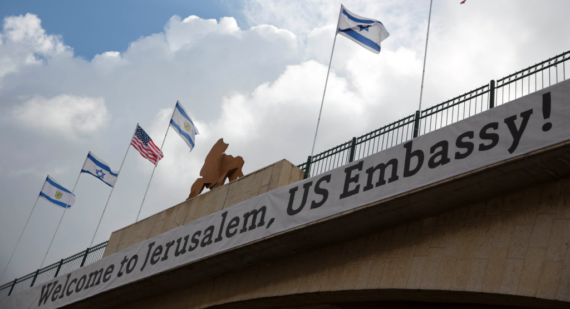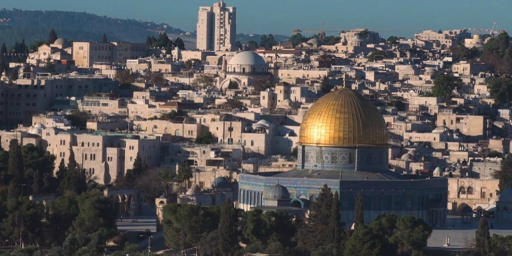U.S. Opens Embassy In Jerusalem Amid Massive Deadly Protests In Gaza
Celebrations and a deadly day in the Middle East.

More than 50 Palestinians have died, and over nearly 2,000 people have been injured in protests in Gaza that erupted at roughly the same time that a delegation from the United States opened the new embassy in Jerusalem pursuant to the directive issued earlier this year by President Trump:
ZEITOUN, Gaza Strip — Israeli forces killed 55 Palestinians on the boundary fence with Gaza on Monday, local health officials said, a level of bloodshed not seen since the most violent days of Israel’s 2014 war in the territory.
The death toll doubled the number of Palestinians killed during six weeks of demonstrations, dubbed the “March of Return,” and came on the same day that a new U.S. Embassy opened in Jerusalem.
Tens of thousands of Palestinians had gathered on the edges of the fenced off blockaded territory from mid-morning. Many came to peacefully demonstrate, bringing their children, carrying flags. Food stalls sold snacks and music blared.
But the protests appeared to have a more violent edge than in previous weeks. Some young men brought knives and fence cutters. At a gathering point east of Gaza City, organizers urged protestors over loudspeakers to burst through the fence, telling them Israeli soldiers were fleeing their positions, even as they were reinforcing them.
Israeli snipers were determined not to allow a breach, and ambulances soon began screaming back and forth from the fence, as gunshots rang out over the crowd. No Israeli soldiers were injured, though, and Israel drew widespread condemnation for an excessive use of force.
More than 2,400 people were injured, according to the Palestinian health ministry in Gaza, including 1,200 from live ammunition.
The United Nations said that “those responsible for outrageous human rights violations must be held to account,” and Human Rights Watch described the killings as a “bloodbath.” Palestinian Authority President Mahmoud Abbas condemned a continuing “massacre” of the Palestinian people. Both Turkey and South Africa announced they were recalling their ambassadors from Israel.
It was jarring contrast with the star-studded opening ceremony for the embassy in Jerusalem, which drew first daughter Ivanka Trump and her husband Jared Kushner.
Hamas has given its backing to the demonstrations, which have galvanized people around a call to protest the loss of Palestinian homes and villages when Israel was formed in 1948.
Palestinians mark that day – known as the “nakba” or “catastrophe” — on Tuesday, when more demonstrations are planned. More than two-thirds of Gaza’s population is descended from refugees who were displaced at the time of Israel’s creation.
At Gaza City’s main al-Shifaa hospital, medics said they were overwhelmed.
“I don’t know how we will manage,” said Ayman al-Sahbani, the head of the emergency department, as families jostled to get in to see injured relatives. “How long can this go on? How long?”
The hospital had set up a new additional 30-bed triage area outside, and earlier in the day said it had the capacity to treat 200 or 300 serious gunshot wounds. It had received around 400 injured by around 6.pm., and most of those had been shot, he said.
“We’ve reached the critical point now,” he said. “A lot of people need operations soon, but the operation room is full.”
While these protests were going on, a delegation that included the President’s daughter and son-in-law along with Cabinet officials and Members of Congress and Senators were in Jerusalem celebrating the opening of the new embassy, which for the moment at least basically just amounts to renaming the consulate in the city to be an embassy:
JERUSALEM — An American delegation including White House officials and major GOP donors officially opened the U.S. Embassy in Jerusalem on Monday, handing Israel a long-sought victory but touching off fresh clashes from outraged Palestinians.
The ceremony — attended by President Trump’s daughter Ivanka — capped Trump’s pledge to shift the U.S. Embassy from Tel Aviv to offer diplomatic recognition to Israel’s claim of Jerusalem as its capital.
The backdrop underscored the repercussions unleashed by the decision.
European allies offered more denunciations of the move as a serious blow to peace efforts between Israelis and Palestinians, who also view part of Jerusalem as capital for a possible future state.
Near Jerusalem, at least two clashes broke out between Israeli forces and Palestinian protesters, the Associated Press reported. On the Gaza Strip border, deadly confrontations erupted Monday in the bloodiest day during a wave of Palestinian protests against Israel’s blockade of the area.]
The Arab League called a crisis meeting to discuss the “illegal” U.S. Embassy shift, and the 57-nation Organization of Islamic Cooperation called it an “attack on the historical, legal, natural and national rights of the Palestinian people.”
Even as the embassy ceremony unfolded, the call for afternoon prayers from a mosque in mostly Arab East Jerusalem could be heard.
For many Israelis, the official move of the embassy is a cause for huge celebration even though the shift was mostly symbolic — adding just a new embassy plaque to the existing U.S. Consulate in Jerusalem.
Israel feels vindicated by the Trump administration’s decision to recognize its capital as Jerusalem. It declared sovereignty over the city 51 years ago following the 1967 Arab-Israeli war, but most countries do not recognize Israel’s rule over the city, where a third of the residents are Palestinian. Most states say their embassies will remain in Tel Aviv until Israelis and Palestinians reach some sort of peace agreement.
“This is a hostile act against international law and against the people of Palestine,” said Saeb Erekat, secretary general of the Palestine Liberation Organization, speaking of the embassy move. “It places the U.S. on the side of the occupying power.”
(…)
Trump did not directly address Palestinians’ grievances over the embassy move or an effective boycott of the Trump administration by Palestinian Authority President Mahmoud Abbas.
“May there be peace,” Trump said in the video message to the crowd that included his daughter Ivanka, son-in-law Jared Kushner and a host of political, religious and communal leaders.
“A great day for Israel,” Trump wrote earlier in a tweet.
Present at the event were some top Republican backers, including GOP super donor and casino magnate Sheldon Adelson. “This is an important event for all Jews,” Adelson said.
Trump has boasted of how he has managed to keep the costs down for the embassy move. In an apparent nod to the bottom line, only pretzels and water were served to some 800 guests at the event.
To be fair, it is worth noting that the Embassy opening is not the main reason for the protests in Gaza, although it certainly seems to have inflamed the situation. Today marks the 70th anniversary of the day that the creation of the State of Israel was officially announced after having been approved by the United Nations as part of a plan that, at the time, would have granted recognition to a state for the Palestinian population in the region. Rather than accept that resolution, though, most of the Arab states instead declared war against the new state in a conflict that the Israelis ultimately won, with much of the Arab population of the former British territory that the state was formed from ending up under the control of either Jordan or, in the case of what came to be known as the Gaza Strip, Egypt. Those territories would remain in the control of those nations until the 1967 War when Israel quickly captured them in a rather one-sided conflict. In any case, President Harry Truman was among the first world leaders to grant formal recognition to the new Israeli state and the rest, of course, has been history. The result of this anniversary has been that, while it has been a day of celebration in Israel, it has traditionally been marked by protests in the Arab world, and especially the West Bank and in Gaza. More such protests are expected tomorrow.
As for the decision to move the embassy itself, President Trump’s decision to move the facility to Jerusalem, which was announced in December, constituted a break with long-standing American foreign policy that has kept the country neutral on the question of the final status of Jerusalem until the issue has been resolved by the Israelis and Palestinians. Regardless of the occupant, the White House has generally taken the position that the establishment of diplomatic relations and location(s) of embassies and consulates is an exclusively Presidential power under the Constitution. That position has been in place since Israel took control of Jerusalem during the Six Day War in 1967 and has been recognized by every American President since then even at the same time that, as candidates, each of these Presidents had made promises that they would recognize the city as Israel’s capital and move the embassy. The issue came to a head during the Clinton Administration when Congress passed a law in 1995 that mandated that the President both recognize Jerusalem as Israel’s capital and move the American embassy there. President Clinton objected to the law and the ground that it interfered with the President’s ability to conduct foreign policy, but the bill became law pursuant to Article 1, Section 7, Clause 2 of the Constitution. Most importantly, the law includes provisions that authorize a Presidential waiver of the requirement to move the embassy based on national security concerns, something that every President since Bil Clinton has done every six months on a regular basis. In the early days of Trump’s Presidency, there were signals that the Administration would be announcing the moving of the embassy very shortly after Inauguration Day. Ultimately, that move never happened and President Trump himself signed the waiver in June 2017. By December, though, Trump had apparently decided the time had come to make the move.
In any case, as I noted at the time, it seems clear that the President’s decision was motivated primarily by domestic politics, and in many respects was a bad deal given the fact that he could have extracted some real concessions from Israeli Prime Minister Netanyahu regarding settlements and other matter. Nonetheless, the deed is done and we’ll just have to wait and see what happens next.
Update: James Joyner has his own thoughts on the contrasting images from Israel and Gaza. Also, it’s worth noting that the protests in Gaza are likely to continue tomorrow, and could spread to Gaza.





no agenda for 2018? my goodness he has accomplished more GOOD than ANY president ever has. he is the greatest who cares about his past it what about the future. and as far as CONTROVERSIAL ? there is none it in JERUSALEM where the BIBLE (God) says it should be All you libs are nuts and you WILL FAIL go TRUMP GO THUS SAITH THE LORD
It’s very important that you take your meds at the same time every day so you don’t suffer relapses where you forget basic punctuation and capitalization rules.
The Bible says the US Embassy should be moved to Jerusalem? Really? Is that II Opinions 9:11 or do I have the passage wrong?
@Just nutha ignint cracker:
It’s the part where they refuse to admit that the person who will supposedly do all this is the Anti-Christ in their own belief system and they’re cheerfully accepted his MAGA Mark of the Beast….